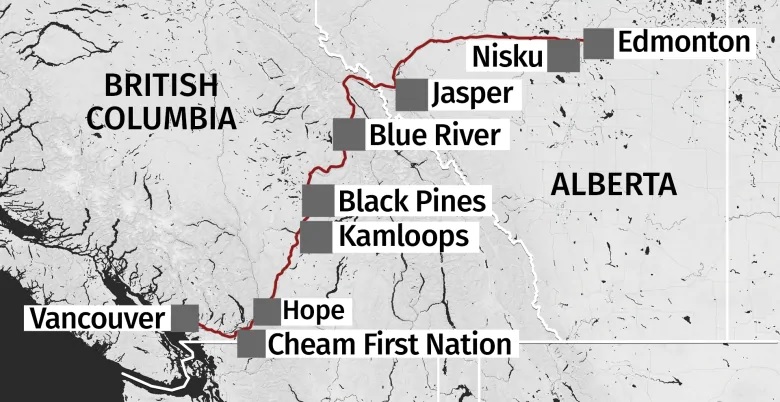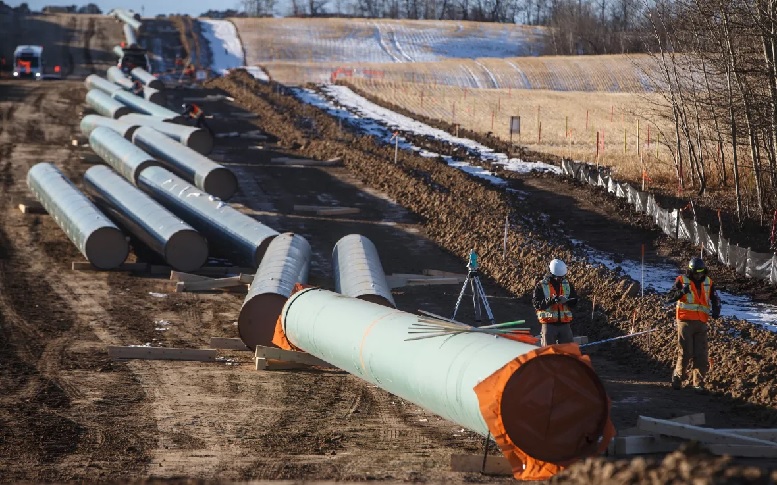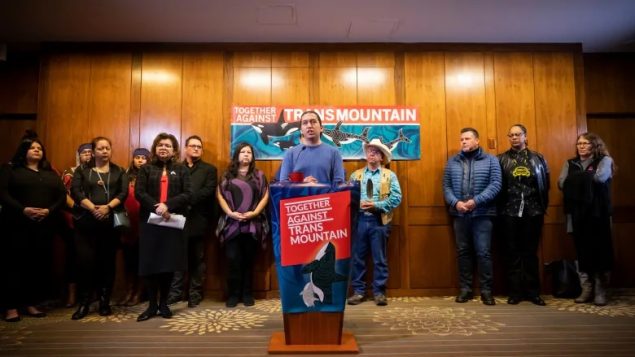The highly contentious Trans Mountain pipeline expansion (TMX) project is back in court yet again. Six challenges to the pipeline were granted access in September to the Federal Court of Appeal in Vancouver to challenge the government’s environmental consultations and re-approval of the project this summer. The groups say the process was mere “window-dressing, box-ticking and nice-sounding words”.
The project to twin the existing pipeline from the Alberta oilfields over the Rocky Mountains to a Pacific coast terminal in British Columbia was first proposed in 2013. It has ever since been fraught with years of protests and legal challenges.

The new line follows the existing one closely, but in the several decades since the original was built in the early 1950’s, much housing and other development has taken place along the route. Greater concern for the environment and Indigenous rights have also highlighted strong objections and court challenges to the project (Scott Galley CBC)
When the legal challenges stalled the project, the American company Kinder Morgan, through its subsidiary, Kinder Morgan Canada, announced it would halt the multi-billion dollar effort. In 2018, the Liberal government of Justin Trudeau then used $4.5 billion of public money to purchase the old existing line and the unfinished project.
A successful legal challenge to the government’s original environmental approval, led to a requirement for more consultations and a subsequent government re-approval of the project in June this year.

Workers survey around pipe to start of right-of-way construction for the Trans Mountain Expansion Project, in Acheson, Alta., on Dec. 3. Work on the 1,150-kilometre pipeline twinning had started again after government re-approval earlier this year. That is now being challenged again in court this week. (Jason Franson/The Canadian Press)
A group of indigenous First Nations bands was in court yesterday for the first day of an expected three days of hearings to challenge the approval of the project.
These include Tsleil-Waututh Nation, Squamish Nation, Coldwater Indian Band, and the Ts’elxwéyeqw Tribes – a group of seven Stó:lō bands with territories near Chilliwack.
The bands point out the seeming conflict of interest on the part of the government. The group notes the governmentis at one and the same time, the owners of the line, the decision makers, proponents, and also and as fiduciary to the First Nations. Thus the group says the subsequent required consultation efforts were not approached with an open mind, and that approval was a foregone conclusion, and thus the consultation was a mere box-ticking exercise. The group is concerned with potential contamination of drinking water, lack of research into the impact of spills and threats to killer whales in the Pacific.

Since the proposed twinning, there have been continued protests by various groups against it. Here a protester holds a photo of Prime Minister Justin Trudeau covered in oil during a protest against the Kinder Morgan Trans Mountain Pipeline expansion in Vancouver, B.C., on Tuesday May 29, 2018. (THE CANADIAN PRESS/Darryl Dyck)
The federal government has said it wants the line completed and operational by mid 2022 and that it would be interested to sell the line back to private interests.
While the First Nations group continues to challenge the line, which would triple current capacity, other First Nations groups have indicated an interest in investing in the line in part or buying it completely.
Meanwhile, there are other hurdles to completion. The line would be put through some 2,500 tracts of land, some indigenous, some Crown land, and many private landowners. As of July of this year, only 67 per cent had signed access agreements to the pipeline corporation.
While over 80 per cent of landowners in Alberta and eastern B.C interior, the number dropped to less than 60 per cent, while in the Lower mainland the approval rate as of July was below 20 per cent.
Additional information
- CBC: J.P.Tasker: Sep 4/19: Federal Court agrees to hear appeal of cabinet’s green light for Trans Mountain pipeline
- Globe and Mail: M. Warburton: Dec 16/19: Court hears from Trans Mountain pipeline foes amid oil industry slump
- Financial Post: G.Morgan: Sep 4/19: Trans Mountain pipeline faces fresh legal challenges after court allows six appeals to proceed
- Canadian Press (via Global News): L Kane: Sep 10/19: Trans Mountain pipeline expansion faces hurdles as landowners dig in heels
- CBC: C.Bellrichard: Dec 16/19: Trans Mountain pipeline expansion approval ‘unlawful,’ First Nations argue as new court challenge begins







For reasons beyond our control, and for an undetermined period of time, our comment section is now closed. However, our social networks remain open to your contributions.